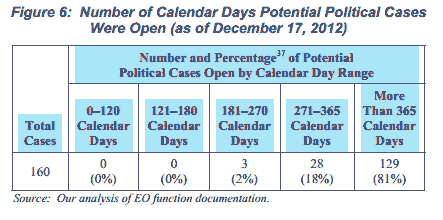Some of the lowlights:
The Determinations Unit developed and used inappropriate criteria to identify applications from organizations with the words Tea Party in their names. These applications (hereafter referred to as potential political cases)13 were forwarded to a team of specialists14 for review. Subsequently, the Determinations Unit expanded the criteria to inappropriately include organizations with other specific names (Patriots and 9/12) or policy positions. While the criteria used by the Determinations Unit specified particular organization names, the team of specialists was also processing applications from groups with names other than those identified in the criteria. The inappropriate and changing criteria may have led to inconsistent treatment of organizations applying for tax-exempt status...
...in May 2010, the Determinations Unit began developing a spreadsheet that would become known as the “Be On the Look Out” listing (hereafter referred to as the BOLO listing),15 which included the emerging issue of Tea Party applications. In June 2010, the Determinations Unit began training its specialists on issues to be aware of, including Tea Party cases. By July 2010, Determinations Unit management stated that it had requested its specialists to be on the lookout for Tea Party applications...
Oh, and the I.G. claims that "only first-line management" made the decision to target Constitutional conservatives.
...[We were told] only first-line management approved references to the Tea Party in the BOLO listing criteria before it was implemented. As a result, inappropriate criteria remained in place for more than 18 months.
Furthermore, once high level management found out about the political retribution enacted by employees, they acted "immediately" to fix it. Only that didn't exactly take.
After being briefed on the expanded criteria in June 2011, the Director, EO, immediately directed that the criteria be changed. In July 2011, the criteria were changed to focus on the potential “political, lobbying, or [general] advocacy” activities of the organization. These criteria were an improvement over using organization names and policy positions. However, the team of specialists subsequently changed the criteria in January 2012 without executive approval because they believed the July 2011 criteria were too broad. The January 2012 criteria again focused on the policy positions of organizations instead of tax-exempt laws and Treasury Regulations.
...Figure 4 shows that approximately one-third of the applications identified for processing by the team of specialists included Tea Party, Patriots, or 9/12 in their names, while the remainder did not.
Further, applications for tax-exempt status were essentially blocked:
Organizations that applied for tax-exempt status and had their applications forwarded to the team of specialists experienced substantial delays. As of December 17, 2012, many organizations had not received an approval or denial letter for more than two years after they submitted their applications. Some cases have been open during two election cycles (2010 and 2012).
But I'm sure that's just a coincidence.
...the average time a potential political case was open as of December 17, 2012, was 574 calendar days (with 158 potential political cases being open longer than the average calendar days it took to close other full development cases). Figure 6 shows that more than 80 percent of the potential political cases have been open more than one year...
...[Because of lengthy delays, some] charitable organizations were eligible to sue the IRS for declaratory
judgment due to the delays in processing applications...
Finally, the IRS requested onerous, intrusive, and invasive information that had nothing to do with the applications for tax-exempt status. But only for the Obama administration's political enemies, mind you.
...the Determinations Unit requested irrelevant (unnecessary) information because of a lack of managerial review, at all levels, of questions before they were sent to organizations seeking tax-exempt status. We also believe that Determinations Unit specialists lacked knowledge of what activities are allowed by I.R.C. § 501(c)(3) and I.R.C. § 501(c)(4) tax-exempt organizations. This created burden on the organizations that were required to gather and forward information that was not needed by the Determinations Unit...
...After media attention, the Director, EO, stopped issuance of additional information request letters and provided an extension of time to respond to previously issued letters...
...We reviewed case file information for all 170 organizations that received additional information request letters and determined that 98 (58 percent) had received requests for information that was later deemed unnecessary by the EO function...
But don't worry, folks. Even though the IRS has become completely infested with partisan Obama hacks, I'm sure we can completely trust them with our most sensitive health care data.





Không có nhận xét nào:
Đăng nhận xét